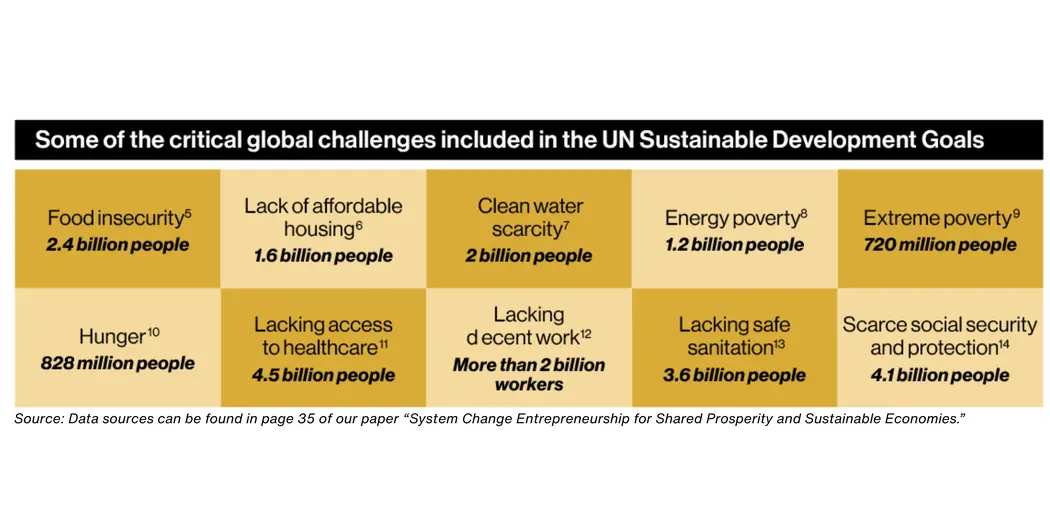MIT Kuo Sharper Center for Prosperity and Entrepreneurship
Entrepreneurship
Rethinking Entrepreneurship: A Systems Change Approach to Shared Prosperity and Sustainability
Valeria Budinich, Scholar-in-Residence, MIT Kuo Sharper Center for Prosperity and Entrepreneurship
Belkys Mones, Social Entrepreneur, Sustainable Development and Gender Equality Advisor
The world is facing a life-threatening emergency due to the acceleration of climate change, the persistence of socioeconomic inequalities, and the deterioration of human rights and democratic governance. As the UN Secretary General, Antonio Guterres, highlighted today at the opening session of the 80th UN General Assembly, this critical moment for humanity requires that we all ask ourselves,
“What kind of world do we choose to build together?”
For business and social entrepreneurs, this question is about their choice to develop solutions to address the “root causes” of today’s critical problems. It is also about their commitment to transform markets for shared prosperity and sustainability.
As shown in the table below, we live in a world where billions of people still don’t have access to safe drinking water, nutritious food, affordable housing, proper sanitation, clean energy or quality healthcare. Entrepreneurs, as well as all Innovation and Entrepreneurship Ecosystems (I&EE) stakeholders, have a huge opportunity to improve the well-being of the people and the planet while they unlock value.
Nevertheless, traditional entrepreneurial approaches often fail to recognize the magnitude of this opportunity and, as a result, develop fragmented solutions that offer limited scale, short-term gains and don’t address the systemic barriers that perpetuate and often aggravate these worldwide challenges.
Systemic market problems require systemic solutions: Can entrepreneurs and I&EE deliver them? The short answer is: Yes! But first, all I&EE stakeholders need to change their mindsets about what constitutes value and learn to unlock it as system changers.
Systems change entrepreneurs are not content with offering ‘a solution.” In the context of market systems transformation, they design for cost-structures that enhance affordability for all, advocate for policies and regulations that foster new forms of value creation, join forces with others to build better infrastructure and, equally important, build a new mindset about how to solve ‘intractable’ problems.
Systems change entrepreneurship is an integrative approach to value creation through innovations that address the root causes of systemic problems to improve people’s well-being and the planet’s sustainability. When transforming market systems, systems change entrepreneurs enable a new market equilibrium, one that accelerates the emergence of more inclusive and sustainable economies.
In our latest white paper, “Systems Change Entrepreneurship for Shared Prosperity and Sustainability,” we offer a new approach to systems change entrepreneurship, one focused on the role of business and social entrepreneurs leveraging markets for economic, social, and environmental impact. Our paper explores:
- How entrepreneurs and other innovators can learn to “think systems” – not value chains - using a framework to rapidly analyze what are the economic and social barriers that prevent a scalable solution (e.g. trends over time, system structures, stakeholder relations, power dynamics, and mental models.)
- What it takes to identify, develop, and implement systemic solutions to transform markets for shared prosperity in global growth markets by analyzing the journeys of leading systems change entrepreneurs.
- How to assess the impact of systems change entrepreneurs by not only measuring the impact at the level of the user of a product or service but also tracking outcomes at the market system dynamics level.
- How addressing the interconnected economic, social, and environmental challenges embedded in the Sustainable Development Goals (SDGs) and Environmental, Social and Governance (ESG) Frameworks and Standards requires entrepreneurs to embrace a new frontier of value creation where co-creation across systems and disciplines leads to sustainable economies and shared prosperity.
- How stakeholders in the local I&E Ecosystems could better support systems change entrepreneurs in global growth markets and provide specific recommendations for corporations, philanthropic and for-profit investors, civil society organizations, as well as governmental institutions and policymakers.
A Call to Action
Given the urgency to solve current systemic problems and the magnitude of the scale of intervention required, all I&E stakeholders must evolve to develop ground-breaking solutions that disrupt and transform global growth markets. Our paper offers the following recommendations for key stakeholders:
- Governments and legislators must enact policies to accelerate the implementation of SDGs and the Paris Agreement, ensuring systemic and long-term solutions.
- Businesses should play a more leading and positive role in co-creation partnerships for a more inclusive and sustainable economy.
- Entrepreneurs and innovators must apply systems thinking to identify root causes rather than symptoms of complex problems while recognizing the interconnectedness of issues.
- Civil society organizations play a critical role in advancing the common good and i systems change innovations to drive market impact. The I&E ecosystem stakeholders must partner with these organizations to accelerate the emergence of a more inclusive and sustainable world.
- Commercial and philanthropic investors should increase access to patient capital, particularly in the early-stage systems change ventures.
- Academic institutions should develop integrated frameworks and applied research initiatives to support students' and entrepreneurs’ ability to advance sustainability and regeneration.
Achieving well-being, global sustainability, and shared prosperity demands bold action from all I&E ecosystem stakeholders. Collaboration across sectors is essential to overcoming urgent challenges, fostering innovation, and building resilient societies that improve the lives of billions of people and the regeneration of our planet.
This paper is a roadmap for system changers committed to lead market systems transformation for shared prosperity and sustainability. Regardless of your current role as an entrepreneur, investor, philanthropist, policymaker, or impact leader, this white paper offers a fresh perspective on how to accelerate systemic impact in markets for the good of all.
Download the full white paper now to learn how systems change entrepreneurship can unlock shared prosperity and sustainable futures—for everyone.
Related Posts




